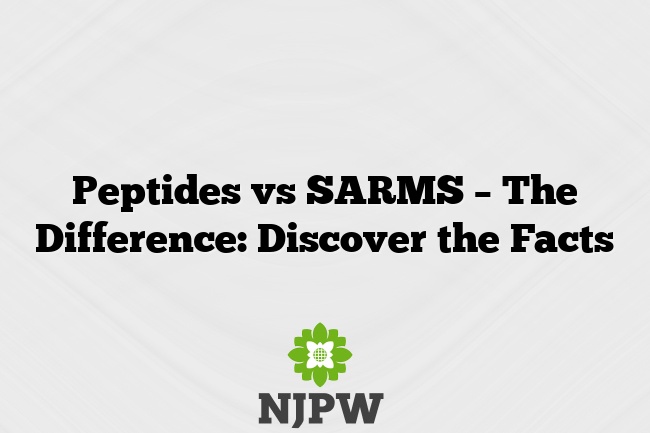Peptides for Weight Loss: Do They Work? – The Science-Backed Facts

Peptides have quietly become a topic of growing interest in the world of weight management. These complex molecular structures hold the potential to unlock new avenues for supporting healthy body composition, but the science behind their effects can be complex. Let’s dive in and explore the facts about peptides and their role in weight loss.
| Key Peptides for Weight Loss | Mechanism of Action | Potential Benefits |
|---|---|---|
| CJC-1295 | Stimulates growth hormone release | Increased metabolism, fat loss, muscle growth |
| Ipamorelin | Selectively stimulates ghrelin receptors | Appetite regulation, improved body composition |
| Sermorelin | Boosts natural growth hormone production | Enhanced fat burning, lean muscle development |
What are Peptides?
Peptides are short chains of amino acids that play crucial roles in the body’s biological processes. Unlike larger proteins, peptides consist of fewer linked amino acids, often ranging from 2 to 50 units. This streamlined structure allows them to interact with specific receptors and trigger targeted physiological responses. In the context of weight management, certain peptides have demonstrated the ability to influence factors like metabolism, appetite, and body composition.
How do Peptides Influence Weight Loss?
The mechanisms by which peptides can support weight loss are multifaceted. Some peptides, such as ghrelin-mimetic compounds, can help regulate hunger and appetite by interacting with the ghrelin receptor. This can lead to reduced caloric intake and potentially assist with weight management. Other peptides, like growth hormone-releasing peptides, can stimulate the body’s natural production of growth hormone, which is known to enhance fat burning and muscle growth. By leveraging these targeted effects, peptides offer a unique approach to supporting healthy weight loss.
The Science Behind Peptides for Weight Loss
The scientific research on peptides and their weight loss applications is rapidly evolving. Numerous studies have explored the specific ways in which these compounds can influence various physiological processes related to body composition. For example, CJC-1295, a synthetic growth hormone-releasing peptide, has been shown to increase lean muscle mass and decrease fat mass in clinical trials. Similarly, Ipamorelin, another ghrelin-mimetic peptide, has demonstrated the ability to enhance fat loss and preserve muscle tissue. The underlying mechanisms involve complex signaling cascades and metabolic pathways that ultimately lead to more favorable body composition outcomes.
Key Peptides Studied for Weight Management
Among the peptides that have garnered significant attention for their weight loss potential, a few stand out:
– CJC-1295: This synthetic peptide stimulates the release of growth hormone, which can boost metabolism and promote fat loss.
– Ipamorelin: As a ghrelin receptor agonist, Ipamorelin can help regulate appetite and support healthy body composition.
– Sermorelin: This peptide stimulates the body’s natural production of growth hormone, leading to enhanced fat burning and muscle growth.
These are just a few examples of the peptides that have been extensively studied for their weight management applications.
Proven Benefits of These Compounds
The scientific evidence surrounding the use of peptides for weight loss is promising. Clinical studies have demonstrated a range of potential benefits, including:
– Increased lean muscle mass
– Reduced body fat percentage
– Enhanced metabolic rate
– Improved body composition
– Regulated appetite and hunger signals
– Preserved muscle tissue during weight loss
These positive outcomes highlight the versatility of peptides in supporting healthy weight management, making them a subject of growing interest in the field of nutrition and fitness.
Potential Risks and Side Effects
While peptides show promise for weight loss, it’s important to acknowledge the potential risks and side effects. Some of the common concerns include:
– Injection site reactions, such as redness, swelling, or pain
– Headaches or dizziness
– Nausea or gastrointestinal discomfort
– Disruptions to the body’s natural hormone balance
– Potential for abuse or misuse
It’s crucial to consult with a healthcare professional before incorporating peptides into a weight loss regimen, as they can provide guidance on appropriate dosing, administration, and monitoring.
Incorporating Peptides into a Healthy Lifestyle
Peptides should not be viewed as a standalone solution for weight loss. Rather, they are most effective when combined with a comprehensive approach that includes a balanced diet, regular exercise, and other healthy lifestyle habits. By integrating peptides as part of a well-rounded strategy, individuals can leverage their potential benefits to support their overall weight management goals.
Optimal Dosing and Administration
The appropriate dosage and administration of peptides for weight loss can vary depending on the specific compound, individual factors, and the guidance of a healthcare professional. Generally, peptides are administered via subcutaneous injection, which allows for efficient absorption and targeted delivery. Proper dosing is crucial to achieve the desired effects while minimizing the risk of side effects. It’s important to follow the instructions provided by the manufacturer or a qualified healthcare provider.
Combining Peptides with Other Weight Loss Strategies
Peptides can be a valuable addition to a multifaceted weight loss plan, but they should not be the sole focus. Effective weight management typically requires a combination of strategies, including:
– Dietary modifications: Adopting a balanced, calorie-controlled diet rich in nutrient-dense foods
– Regular exercise: Incorporating a mix of cardiovascular, strength training, and flexibility activities
– Lifestyle changes: Prioritizing sleep, stress management, and other holistic well-being practices
– Supplementation: Considering other supportive supplements, such as vitamins, minerals, or herbs
By integrating peptides into this comprehensive approach, individuals can maximize their chances of achieving sustainable weight loss and improved overall health.
The Future of Peptides in Weight Management
As the scientific understanding of peptides continues to evolve, their potential applications in weight management are likely to expand. Researchers are exploring new and innovative ways to harness the power of these molecular structures to address the complex challenges of obesity and related metabolic disorders. With ongoing advancements in peptide technology, formulations, and delivery methods, the future of peptides in weight loss and body composition optimization appears promising.
Conclusion
Peptides have emerged as a fascinating area of study in the realm of weight management. These complex molecules have demonstrated the ability to influence various physiological processes related to body composition, metabolism, and appetite regulation. While the scientific research is still unfolding, the potential benefits of incorporating peptides into a comprehensive weight loss strategy are intriguing. By understanding the mechanisms, key peptides, and appropriate usage, individuals can make informed decisions about whether peptides may be a suitable addition to their weight management journey.
Frequently Asked Questions
Are peptides safe for weight loss?
Peptides can be generally safe for weight loss when used under the guidance of a healthcare professional. However, it’s important to be aware of potential risks and side effects, such as injection site reactions or hormonal imbalances. Proper dosing and administration are crucial to minimize any adverse effects.
How long does it take to see results from using peptides for weight loss?
The timeline for seeing results from peptides can vary depending on the individual, the specific peptide compound, and the overall weight loss plan. Some individuals may notice changes in body composition, such as increased lean muscle mass or reduced body fat, within a few weeks. However, more substantial and sustainable results typically require consistent use over a period of several months.
Can peptides be combined with other weight loss supplements?
Yes, peptides can be combined with other weight loss supplements, but it’s essential to consult with a healthcare professional first. The combination of peptides and other supplements, such as vitamins, minerals, or herbs, may have synergistic effects or potential interactions that need to be carefully considered. A comprehensive approach that integrates peptides, diet, exercise, and other supportive measures is generally recommended for optimal weight management.






